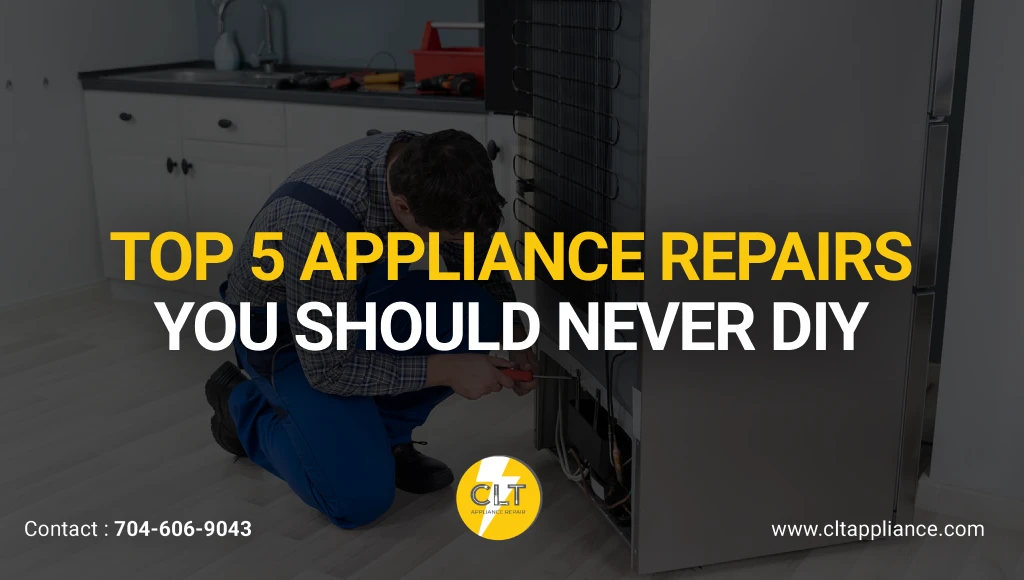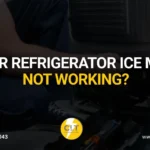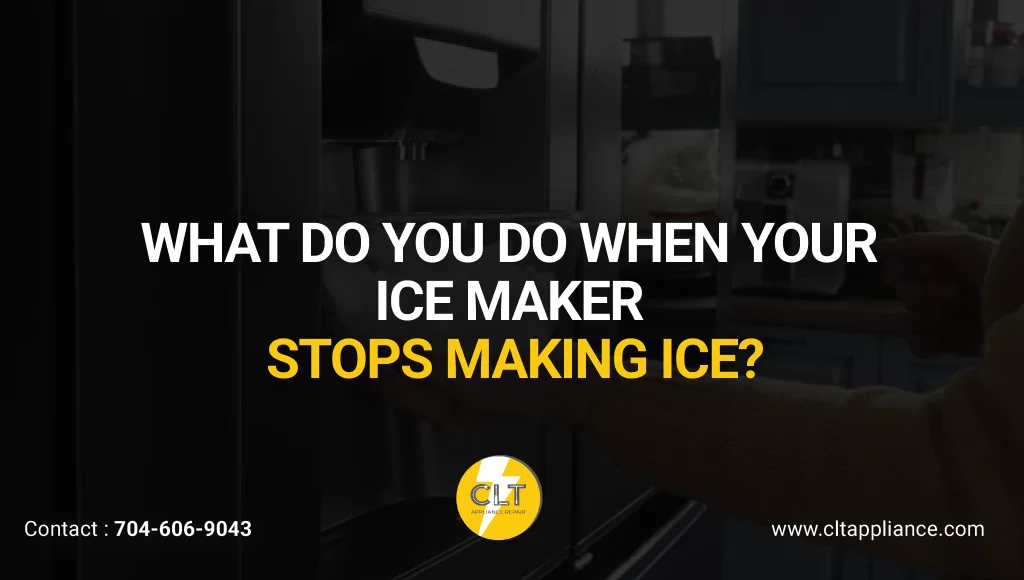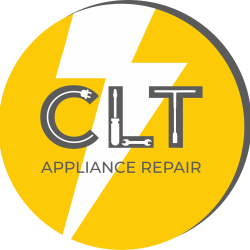Home electrical fires caused by faulty appliances result in devastating property damage and injuries every year. DIY repairs gone wrong contribute significantly to these dangerous incidents.
The DIY trend has transformed how homeowners approach maintenance, but some repairs demand professional expertise. With the global household appliances market size estimated at USD 503.03 billion in 2024, attempting complex home appliance repair tasks can result in severe injuries, expensive damages, voided warranties, and legal complications.
Avoid dangerous DIY fixes with our licensed technicians who are ready to help with CLT Appliance Repair’s professional, same-day service.
[Schedule Safe Appliance Repair: 704-606-9043]
Why Some Appliance Repairs Are Too Dangerous or Complex for DIY
What makes certain repairs too risky for homeowners? These repairs involve deadly hazards that require specialized knowledge and equipment.
Common hazards include:
- Electrical shock and fire risk from high-voltage components
- Gas leaks leading to explosions or poisoning
- Exposure to hazardous refrigerant chemicals
- Warranty violations and local code infractions
1. Electrical Repairs
High-voltage components in appliances can deliver fatal electrical shocks and cause house fires. Electrical repairs pose extreme dangers because appliances contain complex wiring systems and high-voltage components. Even when unplugged, some appliances store electrical charges that can seriously injure or kill.
Key risks include:
- Severe injury or death from electrical shock
- House fires from improper wiring
- Code violations and voided warranties
- Further appliance damage from incorrect repairs
Examples of dangerous electrical repairs:
- Faulty control boards in ovens or dryers
- Blown fuses in washing machines
- Malfunctioning heating elements
- Damaged power cords or internal wiring
Professional technicians use specialized tools and follow safety protocols that protect them and your property during electrical appliance repair.
2. Gas Appliance Repairs (Ovens, Stoves, Dryers)
Gas appliances require specialized knowledge and certification to repair safely. Even small mistakes can create deadly gas leaks or improper combustion that produces carbon monoxide.
Critical dangers include:
- Explosions from gas leaks
- Carbon monoxide poisoning
- House fires from improper connections
- Legal violations requiring licensed professionals
Pro-Tip: If you smell gas near any appliance, immediately turn off the gas supply, ventilate the area, and call professionals – never attempt repairs yourself.
Examples requiring professional intervention:
- Gas ovens or stoves are not igniting properly
- Gas dryer heating issues
- Pilot light problems
- Gas line connections or leaks
Smelling gas from your stove or dealing with faulty wiring? Don’t risk it, trust local professionals.
[Call Now for Emergency Support: 704-606-9043]
3. Refrigerant Issues in Refrigerators and Air Conditioners
Refrigerant systems operate under high pressure and contain chemicals that can harm your health and the environment. Mishandling refrigerants is often illegal and can damage expensive sealed cooling systems. Refrigerants are hazardous chemicals that require EPA certification to handle legally and safely.
Major risks include:
- Health hazards from chemical exposure
- Environmental damage and legal penalties
- Expensive sealed system damage
- Complete appliance failure
Examples of refrigerant-related problems:
- Leaking refrigerant lines
- Compressor failures
- Cooling system blockages
- Pressure regulator issues
Only certified technicians can legally purchase, handle, and dispose of refrigerants during home appliance repair services.
4. Washing Machine and Dishwasher Repairs Involving Water & Electricity
Washing machines and dishwashers combine high-voltage electrical systems with pressurized water systems. This combination requires expert knowledge to repair safely without creating dangerous situations.
Serious hazards include:
- Electrocution from water-electrical contact
- Electrical fires from moisture damage
- Flooding from improper connections
- Complex internal damage from inexperience
Examples requiring professional expertise:
- Faulty motors or pumps
- Leaking drums or door seals
- Electrical control malfunctions
- Water inlet valve problems
5. Smart Appliance or Complex Mechanical Repairs
Modern appliances integrate intricate electronics, software systems, and mechanical components that require specialized diagnostic tools and training.
Smart appliances contain sophisticated computer systems, Wi-Fi connectivity, and complex mechanical parts. DIY attempts often cause software corruption or mechanical damage that renders appliances completely inoperable.
Complex challenges include:
- Intricate electronic systems and software
- Specialized diagnostic equipment requirements
- Mechanical precision for motors and compressors
- Connectivity and programming issues
Examples of complex repairs:
- Smart refrigerator connectivity problems
- Malfunctioning dryer motors or sensors
- Advanced oven programming issues
- Washer control board failures
Professional appliance repair technicians have manufacturer training and specialized tools needed for these advanced systems.
Trust experienced techs to handle it right the first time.
[Book Expert Smart Appliance Repairs: 704-606-9043]
Additional Risks of DIY Appliance Repairs
Beyond immediate safety risks, DIY repairs create long-term financial and legal problems. DIY repairs often create cascading problems that cost more than original professional repairs. Manufacturers void warranties when unauthorized repairs cause damage, leaving homeowners responsible for expensive replacements.
Financial and legal consequences:
- Voided manufacturer warranties
- More expensive secondary problems
- Insurance claim denials
- Legal liability for code violations
When to Call a Professional
Any repair involving electricity, gas, refrigerants, or complex mechanisms requires professional expertise. Professional appliance technicians bring specialized training, proper tools, and insurance protection. They diagnose problems accurately and complete repairs safely while maintaining warranties.
Signs you need professional help:
- Electrical components or wiring are involved
- Gas connections or combustion systems
- Refrigerant or cooling system issues
- Smart technology or complex electronics
- Water and electrical system combinations
Benefits of professional repairs:
- Safety protection for your family
- Warranty preservation and coverage
- Proper diagnostic equipment usage
- Code compliance and legal protection
- Long-term cost savings
Takeaway
Professional home appliance repair is essential for electrical, gas, refrigerant, water-electrical, and smart appliance issues. These five repair types pose serious safety risks that require specialized training and equipment.
Prioritizing expert help over risky DIY attempts protects your family’s safety and saves money long-term. Professional repairs maintain warranties, ensure code compliance, and prevent dangerous accidents.
Ready for Safe, Professional Appliance Repairs?
Don’t risk your family’s safety or your appliance warranties with dangerous DIY repairs. CLT Appliance Repair provides expert service for all major appliance brands with certified technicians who handle electrical, gas, and complex mechanical issues safely.
Contact CLT Appliance Repair today for fast, safe, and reliable appliance repairs that keep your home running smoothly!
[Schedule Your Professional Repair: 704-606-9043]
FAQs
Why shouldn’t I attempt to repair appliances that use gas or electricity myself?
Repairing appliances that use gas or electricity is extremely risky because mistakes can lead to fires, explosions, electric shock, or carbon monoxide poisoning, all of which can cause serious injury or death.
What happens if I try to fix my appliance and it’s still under warranty?
Attempting a DIY repair on an appliance under warranty can void the manufacturer’s coverage, leaving you responsible for all future repair costs, even if the issue would have been covered by the warranty.
Are there any appliance repairs that are safe for homeowners to do themselves?
Homeowners can safely handle minor tasks like cleaning filters, unclogging drains, or changing light bulbs, but anything involving internal components, wiring, gas lines, or refrigerants should be left to professionals.
Why are microwave repairs considered especially dangerous for DIY?
Microwaves contain high-voltage capacitors that can store a lethal electric charge even after being unplugged, making DIY repairs extremely hazardous and best left to certified technicians.
Can I repair a refrigerator myself if it’s not cooling properly?
You should not attempt to repair a refrigerator’s internal components or handle refrigerant leaks yourself because these systems are complex and involve hazardous chemicals that require specialized training and certification to manage safely.
What are the risks of DIY repairs on smart or modern appliances?
Smart appliances often have intricate electronics, software, and connectivity features that require specialized knowledge and tools, so DIY attempts can cause further damage or permanently disable the appliance.
Author

- John Bennett
- John Bennett is a seasoned appliance repair specialist at CLT Appliance Repair, where he brings over a decade of technical expertise and a strong commitment to customer satisfaction. With a background in electrical and mechanical systems, John has built a reputation for reliable, efficient, and honest repair services across a wide range of household appliances-including refrigerators, washing machines, ovens, and more.







